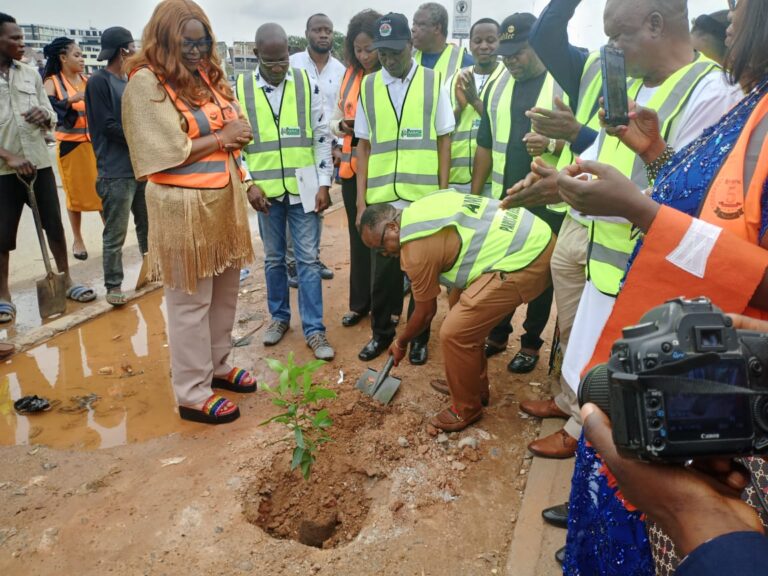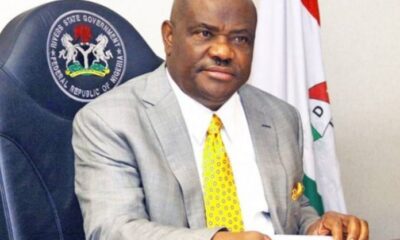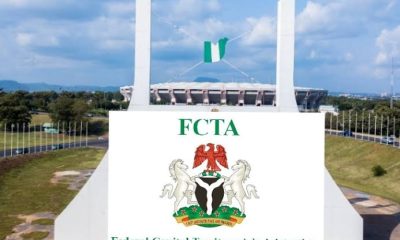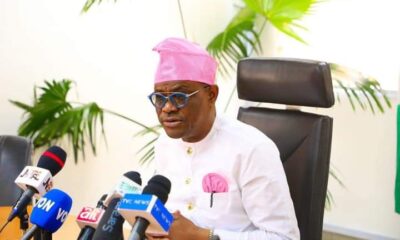Headline
FCTA to remove trees destroying public infrastructure in Abuja – Official

The Federal Capital Territory Administration (FCTA) says it will remove all trees that their roots are destroying public infrastructure, particularly roads in the capital city, Abuja.
Ferdinand Ezeoha, Director, Engineering Service, Federal Capital Development Authority, stated this in Abuja on Tuesday, during a tree planting exercise in Guzape District.
Ezeoha explained that the trees were donated by Women in Energy, Oil and Gas Nigeria.
The director, who noted tree planting has been part of the infrastructural provision for the city, added that the bad trees would be replaced with friendly ones across the city.
He, however, said that the wrong trees, such as the Enterolobium trees, meant for desert areas were planted in most parts of the city, particularly in Maitama and Jabi areas.
He explained that the roots of some of the trees planted in the earlier stages of the development of the FCT were affecting road asphalt around Maitama and Jabi districts.
“Tree planting has been part of the infrastructural provision for the city., which is why there is an area known as the “Green Verge” between the asphalt area and the walkway for planting trees.
“It is, however, very unfortunate that the kind of trees that were planted when the FCT was being developed are now destroying our infrastructure.
“If you go to places like the Maitama and Jabi Districts, you will see that a lot of the trees are now affecting our road infrastructure.
“We have decided to correct the error by planting the type of trees whose roots will not damage our infrastructure,” he said.
Mr Isaiah Ukpana, Director, Parks, and Recreation, FCT, expressed optimism that the trees donated by the women group would support the FCTA’s effort of replacing 20,000 trees in Katampe, Wuye and Guzape Districts.
Ukpana said that the team has made a lot of progress, adding measures were being put in place to ensure that the trees survive human and environmental forces.
“We have water tankers to water the trees and make provisions for chemicals that will be applied to them to ensure their survival.
“We are equally enlightening citizens on the need to protect trees and not to destroy them,” he said.
Headline
EFCC bars dollar transactions, orders embassies to charge in naira

The Economic and Financial Crimes Commission has barred foreign missions based in Nigeria from transacting in foreign currencies and mandated them to use Naira in their financial businesses.
The EFCC has also mandated Nigerian foreign missions domiciled abroad to accept Naira in their financial businesses.
The anti-graft agency said the move is to tackle the dollarisation of the Nigerian economy and the degradation of the naira
The Commission, therefore, asked the government to stop foreign missions in Nigeria from charging visa and other consular services in foreign denominations.
The EFCC gave the advisory in a letter to the Minister of Foreign Affairs, Amb. Yusuf Tuggar, for onward transmission to all foreign missions in the country.
In the letter, the EFCC said it issued the advisory because the practice of paying for consular services in dollars was in conflict with extant laws and financial regulations in Nigeria.
In a letter dated April 5, 2024, which was addressed to the Minister of Foreign Affairs, Ambassador Yusuf Tuggar, titled: “EFCC Advisory to Foreign Missions against Invoicing in US Dollar,” the EFCC Chairman, Ola Olukoyede expressed dismay over the invoicing of consular services in Nigeria by foreign missions in dollars.
The EFCC cited Section 20(1) of the Central Bank of Nigeria Act, 2007, which makes currencies issued by the apex bank the only legal tender in Nigeria.
The letter read, “I present to you the compliments of the Economic and Financial Crimes Commission, and wish to notify you about the commission’s observation, with dismay, regarding the unhealthy practice by some foreign missions to invoice consular services to Nigerians and other foreign nationals in the country in United States dollar ($).
“It states that ‘the currency notes issued by the Bank shall be the legal tender in Nigeria on their face value for the payment of any amount’.
“This presupposes that any transaction in currencies other than the naira anywhere in Nigeria contravenes the law and is, therefore, illegal.”
The commission further stated that the rejection of the naira for consular services in Nigeria by certain missions, along with non-compliance with foreign exchange regulations in determining service costs, is not just unlawful but also undermines the nation’s sovereignty embodied in its official currency.
The letter continues: “This trend can no longer be tolerated, especially in a volatile economic environment where the country’s macroeconomic policies are constantly under attack by all manner of state and non-state actors.
“In light of the above, you may wish to convey the commission’s displeasure to all missions in Nigeria and restate Nigeria’s desire for their operations not to conflict with extant laws and regulations in the country.”
Diplomatic sources said yesterday, May 10, that some embassies were wondering whether the EFCC’s advisory represented the position of the Federal Government.
Headline
Prince Harry visits sick Nigerian soldiers in Kaduna

Prince Harry and his team visited the 44 Nigerian Army Reference Hospital in Kaduna to interact with wounded soldiers who are receiving treatment.
The Duke of Sussex is in Nigeria with his wife to champion the Invictus Games, which Harry founded to aid the rehabilitation of wounded and sick servicemembers and veterans.
Nigeria joined the Invictus Community of Nations in 2022 becoming the first African country to join.
Prince Harry’s visit to Kaduna came 68 years after his late grandmother Queen Elizabeth II visited the state during the time of the late Premier of Northern Region Sir Ahmadu Bello.




-

 Business5 days ago
Business5 days agoNigeria needs over $2bn to revive Ajaokuta Steel Plant, says Minister
-

 Headline5 days ago
Headline5 days agoSuspend cybersecurity levy– Reps to CBN
-

 Headline3 days ago
Headline3 days agoPrince Harry visits sick Nigerian soldiers in Kaduna
-

 Entertainment3 days ago
Entertainment3 days agoAMVCA Cultural Day: BBNaija’s Neo, Venita win Best Dressed Male, Female
-

 News5 days ago
News5 days agoShan George’s money returned to Zenith Bank account
-

 Metro3 days ago
Metro3 days agoEx-Sports Minister laments after hospital neglected him for hours over N80000 deposit
-

 Headline5 days ago
Headline5 days agoTinubu resumes work after foreign trip











